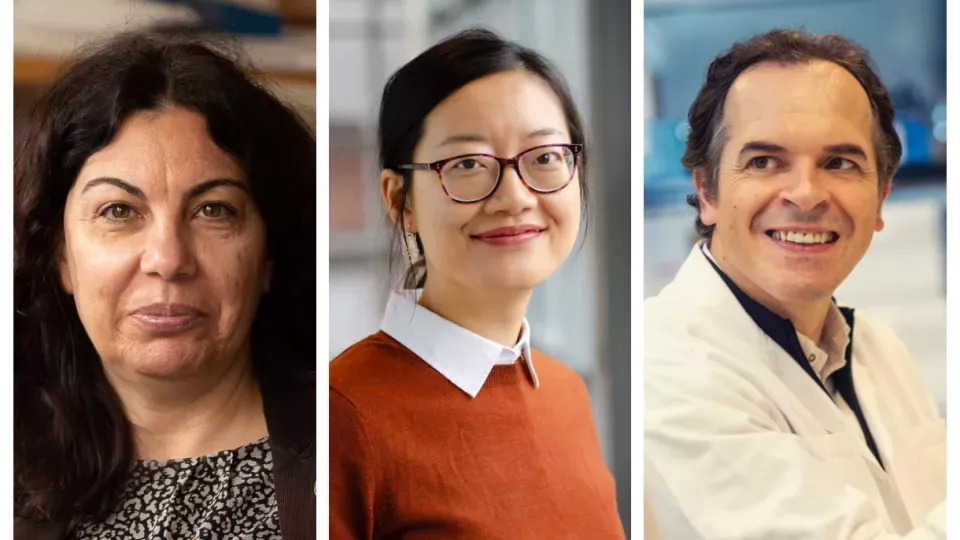LTH researcher receive 26 million from the Wallenberg Foundation
Three researchers from Lund University have been awarded a total of 87 million SEK in grants from the Knut and Alice Wallenberg Foundation for research on future semiconductors, our immunological memory, and next-generation gene therapies. One of them is Vanya Darakchieva, Professor of Solid State Physics.
– Published 18 October 2024

The Knut and Alice Wallenberg Foundation has awarded SEK 835 million in grants to 30 projects in medicine, the natural sciences and engineering that are deemed to have the potential to lead to future scientific breakthroughs. The foundation applies a strict peer-review procedure through applications being assessed by the foremost international researchers in each specific field.
Vanya Darakchieva, professor of solid state physics, receives SEK 26 million over five years for the project “Transforming ceramics into next-generation semiconductors”
The project’s vision is to develop a new type of eco-friendly semiconductor with ultra-wide bandgap (UWBG) based on metal oxides and metal nitrides. Ultra-wide bandgap is a property of certain materials that enables them to handle much higher voltages and temperatures compared with conventional conductor materials such as silicon. This makes possible the development of electronic units with high power and very high energy efficiency, as well as a new power transmission concept that could drastically reduce energy losses. UWBG materials can be used in powerful electronic components that function more effectively under extreme conditions, for example in power transmission or high-performance electronics.
“I’m very grateful because with this project we get a unique chance to focus on unexplored high-field and non-equilibrium physics phenomena in ultra-wide bandgap semiconductors in a holistic way, encompassing synthesis, theory, modelling, characterisation and nanoelectronics device design and fabrication. This empowers our team to become an important contender in the world race for finding solutions for the creation of the future smart energy grid and the electrification of transportation,” says Vanya Darakchieva.
Project: “Transforming ceramics into next-generation semiconductors”
Awarded grant: SEK 26 million over five years
Principal investigator: Vanya Darakchieva, Lund University
Co-applicants: Erik Lind and Mattias Schubert, Lund University, Igor Abrikosov and Per Persson, Linköping University
Joan Yuan receives SEK 26 million over five years for the project “Dissecting the unexplored dimensions of B cell memory”.
Joan Yuan wants to examine how our immunological memory is formed. She hopes that this will generate knowledge about how we could optimise the immune system and develop better vaccination strategies.
Our B cells create an immunological long-term memory after an infection or vaccination. This forms the basis for the body’s long-term immune system.
“These cells remember the foreign substance, which means that the body can react faster and more robustly if it is exposed to the same substance in the future,” says Joan Yuan, researcher and associate professor of immunology.
Project: “Dissecting the unexplored dimensions of B cell memory”
Awarded grant: SEK 26 million over five years
Principal investigator: Joan Yuan, Lund University
Co-applicants: Taras Kreslavskiy and Karin Loré, Karolinska Institutet, Davide Angeletti and , University of Gothenburg
Filipe Pereira receives SEK 35 million over five years for the project “Neoantigen discovery with cellular reprogramming”.
Filipe Pereira, researcher at Lund University, bases next-generation immunotherapies on reprogramming the cancer cells into immune system cells. He wants to use tumour-specific antigens to increase the efficacy of cancer immunotherapies.
Every time cancer cells mutate, new antigens – neoantigens – are produced. These are presented on the surface of cancer cells and differ from the protein of healthy cells. Our T cells, which are part of the immune system, can identify these neoantigens as potentially harmful and therefore eliminate the cells that carry them. Cancer immunotherapy utilises the T cells’ ability by stimulating our immune system with vaccines or neoantigen-specific T cell therapies.
“We have two goals. One is to test the identified neoantigens in cancer vaccine and the other is to create a platform for T cell therapies that are specific for neoantigens and in this way increase the efficacy of cancer immunotherapies,” says Filipe Pereira.
Project: “Neoantigen discovery with cellular reprogramming”
Awarded grant: SEK 35 million over five years
Principal investigator: Filipe Pereira, Lund University
Co-applicants: Camila Consiglio, Lund University,Janne Lehtiö and Hanna Eriksson, Karolinska Institutet
Read more about all the grants here:
https://kaw.wallenberg.org/en/press/sek-835-million-grants-30-excellent-research-projects
